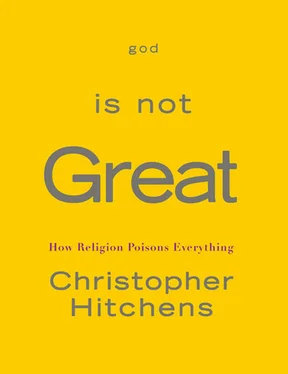Then there is the very salient question of what the commandments do not say. Is it too modern to notice that there is nothing about the protection of children from cruelty, nothing about rape, nothing about slavery, and nothing about genocide? Or is it too exactingly “in context” to notice that some of these very offenses are about to be positively recommended? In verse 2 of the immediately following chapter, god tells Moses to instruct his followers about the conditions under which they may buy or sell slaves (or bore their ears through with an awl) and the rules governing the sale of their daughters. This is succeeded by the insanely detailed regulations governing oxes that gore and are gored, and including the notorious verses forfeiting “life for life, eye for eye, tooth for tooth.” Micromanagement of agricultural disputes breaks off for a moment, with the abrupt verse (22:18) “Thou shalt not suffer a witch to live.” This was, for centuries, the warrant for the Christian torture and burning of women who did not conform. Occasionally, there are injunctions that are moral, and also (at least in the lovely King James version) memorably phrased: “Thou shalt not follow a multitude to do evil” was taught to Bertrand Russell by his grandmother, and stayed with the old heretic all his life. However, one mutters a few sympathetic words for the forgotten and obliterated Hivites, Canaanites, and Hittites, also presumably part of the Lord’s original creation, who are to be pitilessly driven out of their homes to make room for the ungrateful and mutinous children of Israel. (This supposed “covenant” is the basis for a nineteenth-century irredentist claim to Palestine that has brought us endless trouble up to the present day.)
Seventy-four of the elders, including Moses and Aaron, then meet god face-to-face. Several whole chapters are given over to the minutest stipulations about the lavish, immense ceremonies of sacrifice and propitiation that the Lord expects of his newly adopted people, but this all ends in tears and with collapsing scenery to boot: Moses returns from his private session on the mountaintop to discover that the effect of a close encounter with god has worn off, at least on Aaron, and that the children of Israel have made an idol out of their jewelry and trinkets. At this, he impetuously smashes the two Sinai tablets (which appear therefore to have been man-made and not god-made, and which have to be redone hastily in a later chapter) and orders the following:
“Put every man his sword by his side, and go in and out from gate to gate throughout the camp, and slay every man his brother, and every man his companion, and every man his neighbor.”
And the children of Levi did according to the word of Moses, and there fell of the people that day about three thousand men.
A small number when compared to the Egyptian infants already massacred by god in order for things to have proceeded even this far, but it helps to make the case for “antitheism.” By this I mean the view that we ought to be glad that none of the religious myths has any truth to it, or in it. The Bible may, indeed does, contain a warrant for trafficking in humans, for ethnic cleansing, for slavery, for bride-price, and for indiscriminate massacre, but we are not bound by any of it because it was put together by crude, uncultured human mammals.
It goes without saying that none of the gruesome, disordered events described in Exodus ever took place. Israeli archaeologists are among the most professional in the world, even if their scholarship has sometimes been inflected with a wish to prove that the “covenant” between god and Moses was founded on some basis in fact. No group of diggers and scholars has ever worked harder, or with greater expectations, than the Israelis who sifted through the sands of Sinai and Canaan. The first of them was Yigael Yadin, whose best-known work was at Masada and who had been charged by David Ben-Gurion to dig up “the title deeds” that would prove the Israeli claim to the Holy Land. Until a short time ago, his evidently politicized efforts were allowed a certain superficial plausibility. But then much more extensive and objective work was undertaken, presented most notably by Israel Finkelstein of the Institute of Archaeology at Tel Aviv University, and his colleague Neil Asher Silberman. These men regard the “Hebrew Bible” or Pentateuch as beautiful, and the story of modern Israel as an all-around inspiration, in which respects I humbly beg to differ. But their conclusion is final, and the more creditable for asserting evidence over self-interest. There was no flight from Egypt, no wandering in the desert (let alone for the incredible four-decade length of time mentioned in the Pentateuch), and no dramatic conquest of the Promised Land. It was all, quite simply and very ineptly, made up at a much later date. No Egyptian chronicle mentions this episode either, even in passing, and Egypt was the garrison power in Canaan as well as the Nilotic region at all the material times. Indeed, much of the evidence is the other way. Archaeology does confirm the presence of Jewish communities in Palestine from many thousands of years ago (this can be deduced, among other things, from the absence of those pig bones in the middens and dumps), and it does show that there was a “kingdom of David,” albeit rather a modest one, but all the Mosaic myths can be safely and easily discarded. I do not think that this is what the sour critics of faith sometimes call a “reductionist” conclusion. There is great pleasure to be had from the study of archaeology and of ancient texts, and great instruction, too. And it brings us ever nearer to some approximation of the truth. On the other hand, it also raises the question of antitheism once more. In The Future of an Illusion , Freud made the obvious point that religion suffered from one incurable deficiency: it was too clearly derived from our own desire to escape from or survive death. This critique of wish-thinking is strong and unanswerable, but it does not really deal with the horrors and cruelties and madnesses of the Old Testament. Who—except for an ancient priest seeking to exert power by the tried and tested means of fear—could possibly wish that this hopelessly knotted skein of fable had any veracity?
Well, the Christians had been at work on the same wishful attempt at “proof” long before the Zionist school of archaeology began to turn a spade. Saint Paul’s Epistle to the Galatians had transmitted god’s promise to the Jewish patriarchs, as an unbroken patrimony, to the Christians, and in the nineteenth and early twentieth centuries you could hardly throw away an orange peel in the Holy Land without hitting a fervent excavator. General Gordon, the biblical fanatic later slain by the Mahdi at Khartoum, was very much to the fore. William Albright of Baltimore was continually vindicating Joshua’s Jericho and other myths. Some of these diggers, even given the primitive techniques of the period, counted as serious rather than merely opportunistic. Morally serious too: the French Dominican archaeologist Roland de Vaux gave a hostage to fortune by saying that “if the historical faith of Israel is not founded in history, such faith is erroneous, and therefore, our faith is also.” A most admirable and honest point, on which the good father may now be taken up.
Long before modern inquiry and painstaking translation and excavation had helped enlighten us, it was well within the compass of a thinking person to see that the “revelation” at Sinai and the rest of the Pentateuch was an ill-carpentered fiction, bolted into place well after the nonevents that it fails to describe convincingly or even plausibly. Intelligent schoolchildren have been upsetting their teachers with innocent but unanswerable questions ever since Bible study was instituted. The self-taught Thomas Paine has never been refuted since he wrote, while suffering dire persecution by French Jacobin antireligionists, to show
Читать дальше












